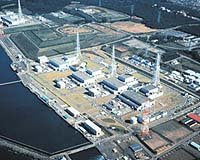 Germany presented to the UN atomic watchdog Tuesday proposals for an international nuclear fuel bank to meet growing international interest in atomic energy, while reducing the risk of such technology being misused for proliferation purposes.
Germany presented to the UN atomic watchdog Tuesday proposals for an international nuclear fuel bank to meet growing international interest in atomic energy, while reducing the risk of such technology being misused for proliferation purposes.Under the plan, entitled the Multilateral Enrichment Sanctuary Project (MESP), countries interested in nuclear technology for purely peaceful purposes would be guaranteed access to nuclear fuel, said the German ambassador to the International Atomic Energy Agency, Peter Gottwald.
At the same time, the MESP would be supervised by the IAEA, thus enabling better control over the sensitive elements of the nuclear fuel cycle.
"Germany respects the right of every country to decide on its own energy mix, including nuclear energy," Gottwald said.
"We respect the inalienable right of every country to the peaceful use of nuclear energy, yet at the same time we all share a clear interest in minimising possible proliferation risks emanating from the predicted wider use of nuclear power for civil purposes."
Germany's proposal for an "International Enrichment Centre" under IAEA control would accommodate "legitimate concerns of potential consumers, who are interested in using nuclear energy," but at the same time, address "well-founded proliferation concerns of the international community," the envoy said.
Under the proposals, an IAEA-supervised, commercially-administered uranium enrichment plant would be built on international property to be donated by a host country.
The legal standing of the plant's territory would be akin to the status afforded to international organisations in other host countries, whereby the IAEA would be given sovereign rights over the territory.
The plant would be operated by a private firm. In order to diversify control over global enrichment capacity, the German proposal recommends that the site be based in a country that does not currently have enrichment capability.
Uranium enrichment for trade currently takes place in France, Germany, the Netherlands, Russia, Britain and the United States.
Additional criteria for the host country included the need for "reliable infrastructure, good accessibility, political stability, and full adherence to safeguards agreements and the Non-Proliferation Treaty," Gottwald said.
Similar ideas have already been put forward in the past, including one for an international uranium enrichment centre in Siberia and a proposal by the Nuclear Threat Initiative (NTI), a US-based non-governmental organisation, for a nuclear fuel bank at a location designated by the IAEA.
Source: Agence France Pressee
No comments:
Post a Comment